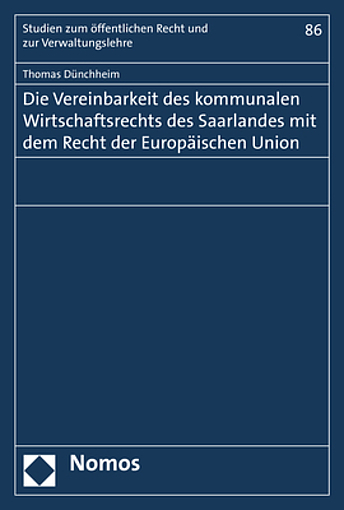englischAccording to the findings of the monopoly commission as laid down in Hauptgutachten XX, a regulation on competition in financial markets of June 2014, the principle of regionality found in Germany’s savings bank law constitutes a regional cartel, which is forbidden in the eyes of European competition law. Communal business law in Saarland lays down strict stipulations in relation to the principles of ‘Örtlichkeit’ (according to which local governments address only local issues) and subsidiarity, which places extremely tight constraints on public utility companies, particularly in the field of energy supply, when it comes to them entering into competition with other providers and confronting the sizeable infrastructural tasks related to the changes in energy policy and digitalisation. The author of this study therefore believes there are substantial grounds to analyse and reevaluate the legitimacy of the stipulations on regional economics for local businesses in Saarland. In doing so, he focuses on the ruling of the European Court of Justice from 22nd October 2013 in the matter of ‘The Netherlands v. Essent’, in which the court decided that national and local businesses were allowed to invoke the fundamental freedoms guaranteed by the Treaty on the Functioning of the European Union and thus oppose the state.
Nach den Feststellungen der Monopolkommission im Hauptgutachten XX (2012/2013) vom Juni 2014 stellt das sparkassenrechtliche Regionalprinzip ein verbotenes Gebietskartell nach den Vorgaben des europäischen Kartellrechts dar. Das kommunale Wirtschaftsrecht des Saarlandes sieht besonders strenge Vorgaben zum Örtlichkeitsprinzip und zum Subsidiaritätsprinzip vor, die es Stadtwerken insbesondere im Bereich der Energieversorgung nur in sehr engen Fesseln erlaubt, im Wettbewerb anzutreten und sich den großen Infrastrukturaufgaben der Energiewende und Digitalisierung zu stellen. Es besteht vor diesem Hintergrund Anlass, die Zulässigkeit der kommunalwirtschaftlichen Vorgaben für kommunale Unternehmen im Saarland zu analysieren und neu zu vermessen. Hierbei gerät insbesondere die Entscheidung des EuGH vom 22. Oktober 2013 in der Rechtssache "Niederlande/Essent" in den Blick: Dort hatte der Gerichtshof festgestellt, dass sich staatliche und kommunale Unternehmen gegenüber dem Mitgliedstaat auf die Grundfreiheiten des AEUV berufen dürfen.


